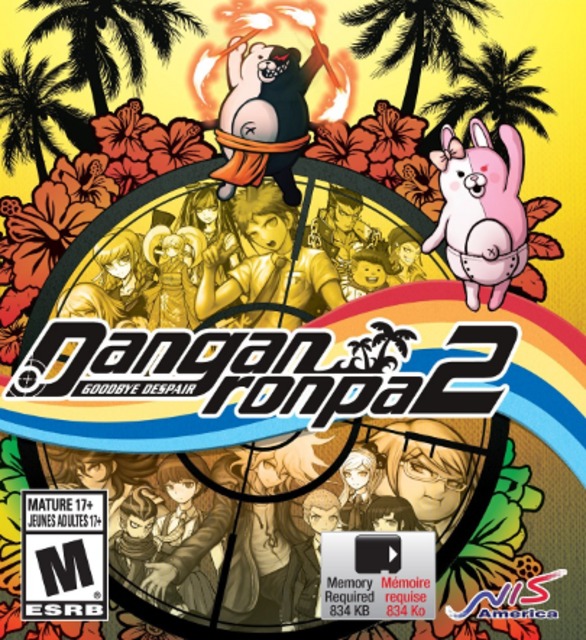Hello insanity
After the way the first game in the series - Danganronpa: Trigger Happy Havoc - ended without any proper resolution for our survivors, I was eagerly awaiting the answers to just what was going on out there in the world after the much ballyhooed "most biggest, most awful, most tragic event in human history". And I got those answers... quite a bit later. For better or worse, Danganronpa 2: Goodbye Despair spends the vast majority of it's time completely removed from the events of the first game and only begins doubling back into that stuff as you barrel towards the conclusion of the killing school trip. It may be a bit of a tease in that regard, but the strong characters and quirky setting make the journey to that resolution a crazy thrill ride, even if some of the problems of the first game made their way over here as well.
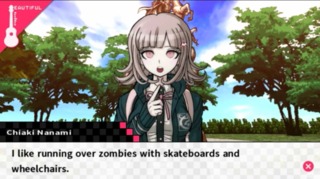
Just like last time, you, the player, find yourself in control of a seemingly average student - Hajime Hinata - surrounded by a cast of "talented" weirdos and lunatics all recruited to Hope's Peak Academy for their immense skill and promise in one field or another. Known as the "ultimates", the cast of characters ranges from a secretly Cajun Ultimate Cook, to the chuunibyou edgelord Ultimate Breeder (of hamsters), to the air-headed goth/punk/whatever the hell she is Ultimate Musician. Finding yourselves stranded on the mysteriously abandoned Jabberwock Island resort, Hope's Peak "headmaster" and sentient stuffed animal Monokuma has once again began a game of killing where the reward is freedom for the student who can commit a murder and not be found out in a trial of all their peers. This time around, Monokuma is joined by his "little sister" Monomi, who is trapped on the island with all of you while not actually playing the killing game, or helping in it's orchestration.
The basic gameplay has not seen much of an overhaul, but there have been several small improvements that add up to make a more enjoyable experience. There are still a bunch of mini-games in the class trial sections outside of the contradiction spotting, but at least this time most of them are okay. The Hangman's Gambit has seen a bit of an upgrade, as well as the PTA rhythm game, and the new Logic Dive game is fine, although the Rebuttal Showdowns, the games featuring you "cutting" through phrases in one-on-one debates is a bit of a pain. What I chose to take away from these experiences is that they're better than they could have been, and don't take up too much time, leaving most of puzzle solving to the Non-Stop Debates. These are definitely the best sections of the game, as you take the evidence you have collected - your "Truth Bullets" - and use them to shoot down the orange contradictory statements made by the others in the room. New to this game are blue coloured statements that you use your evidence to agree with rather than argue, which makes for an interesting wrinkle to the flow and formula of the debates.
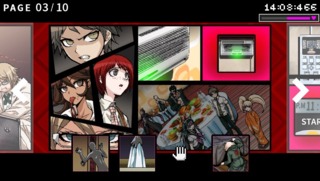
The comic book puzzles where you order the events of the murder at the conclusion of each trial have also been greatly improved. Now each panel and piece can be hovered over to determine the context of what you're looking at, and you're given the pieces in "hands" of five or six at a time instead of having them all at once. As one of the most disappointing aspects of the first game, it's really fun to put the crime together panel by panel and watch your creation play out at the end.
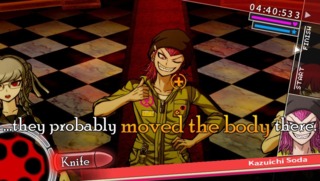
I kind of skipped over the other phases of the game to go right to the trials because they stick out as the most important aspect of determining whether or not someone would like these games. The contradiction detecting and disproving are almost like their own language that can be simple to grasp or incredibly frustrating from person to person. I myself would say I lie somewhere in the middle, sometimes finding the answer obvious and other times being hung up on one way of solving a problem that I don't see what the game wants. This is absolutely one of the biggest holdovers from the first game, there being only one solution to any given puzzle sometimes feels limiting or confusing. There were multiple times where I felt like the evidence I was presenting proved the point I was trying to establish, only to find that it was not what the game wanted, and forcing me to look at things differently. While this is grating and annoying sometimes, I don't know what the alternative is, and honestly, being forced to look at things from a different perspective is more often than not a good thing anyways, so it's a pretty conflicted criticism. It's worth noting that while you do have a health meter of sorts, and you are under a time limit in each individual segment, there's really no penalty for just losing and starting over, so if you try at something long enough you'll probably find the answer eventually.
Aside from the Class Trials, there are two other main phases of the game: Free Time and Investigation. During your free time, you can spend your afternoons with your other classmates to learn their back stories and socialize with them, as well as learn new skills to be used in the trials. After a murder has been committed, however, you will find yourself in the investigation phase, where you will need to accrue evidence to be used in the trial to suss out whodunit. These sections are all in first person and feature limited voice work over the largely text based dialogue, but the trials are completely voiced, and voiced surprisingly well. In fact, the sound in general tends to be excellent across the board, from voice acting, to sound effects, to the music. All of this - and the series trademark dirty humour, which is even more prevalent this time - lends itself to the infectiously cool style of Danganronpa.
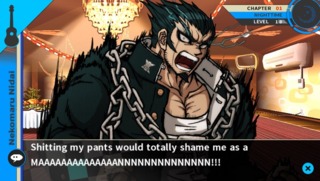
The story of the game is primarily conveyed through visual novel-like dialogue sections, which can be quite lengthy, but rarely tend to drag. "Lengthy" is a word I would use to describe the whole game as it is easily quite a bit longer than the first one, taking me around thirty hours to complete. As well, each trial has an intermission point about halfway through them to allow for a save prompt or a break if it's needed. That is to say every trial but one, as the last trial - the longest one - bizarrely stands alone as the only trial without a hard break in the middle. The plot itself, and the structure of events and plot points therein is incredibly reminiscent of the first game, but, at the risk of saying too much, in an almost Metal Gear Solid 2 kind of way, this familiarity is actually intentional, and the fact that it's addressed within the game shows a surprising self-awareness that I did not give developer Spike Chunsoft credit for, and I was pleasantly surprised by. Even though it takes legitimately more than 90% of the game to get there, the events of the first game do wrap back around to be involved here, providing the closure that I know at least I was disappointed at not being found in the end of the previous installment.
One last thing I have to say, however, is that the I had some serious problems with the conclusion of one of the cases, specifically the fifth trial. The rules and spirit of the game within a game, meaning the killing game, are so stretched and fudged and bent in favor of the "letter of the law" as it were that it feels at odds with attitude of the game, not to mention at odds with how all the previous trials, across both games, had been resolved up to that point. It was by no means a deal-breaker, and it could just be me, but it was the only aspect of the game I got angry at and felt insulted by, and caused me to question why we were even doing this. Bringing up the actual legality of the scenario in question just seems foolish because, c'mon, there's also a talking bear and a bunch of cartoon crap going on, but there's no way this result would ever actually fly.
There may be some tedious mini-games and questionable narrative choices, but they don't take away from the overall product enough to not recommend Danganronpa 2 as another solid visual novel style puzzle game. The investigation and contradiction finding aspects can be found in other games out there like those found in the Ace Attorney and Zero Escape series games, but there's nothing else out there that does this with the bonkers attitude of Danganronpa. The characters, from their mannerisms to their appearance have so much style and, well, character to them that it's hard not to be entertained by their buffoonery, and the story is so funny, engrossing, and at times incredibly dark that it's hard to put down. The way the phases are segmented allows for a good feeling of accomplishment and progress, even if you only play one segment per session and decide to pick it up again later. The quirkiness of the whole thing will definitely put some people off, but if you're even slightly interested, Danganronpa continues to be a thing worth checking out.
